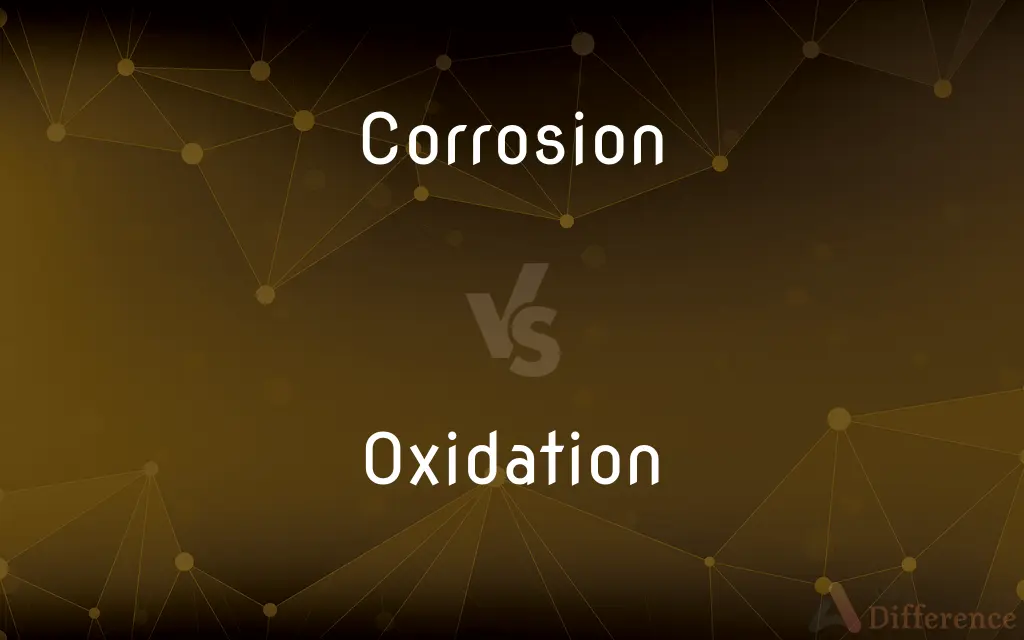Corrosion vs. Oxidation — What's the Difference?
By Maham Liaqat & Urooj Arif — Updated on March 20, 2024
Corrosion involves the degradation of materials, especially metals, due to chemical reactions, often involving oxidation. Oxidation is a chemical reaction where a substance loses electrons, often involving oxygen.

Difference Between Corrosion and Oxidation
Table of Contents
ADVERTISEMENT
Key Differences
Corrosion is a chemical or electrochemical process leading to the deterioration of materials, primarily metals, as they react with their environment, often resulting in the formation of oxides or other compounds. On the other hand, oxidation is a broader chemical reaction where an atom, ion, or molecule loses electrons, frequently involving oxygen but not exclusively.
The process of corrosion typically manifests as rusting in iron and steel, where the material undergoes oxidation as part of its reaction with moisture and oxygen, leading to the characteristic red oxide. Whereas oxidation can occur with a wide range of substances, not limited to metals, and results in the substance losing electrons, which can happen with or without the presence of oxygen.
Corrosion is often considered a specific case of oxidation that occurs on metal surfaces, leading to significant material damage and economic loss. On the other hand, oxidation is a fundamental chemical process that is not inherently damaging and can occur in numerous beneficial contexts, such as the formation of protective oxide layers on certain metals like aluminum.
In the context of corrosion, prevention strategies are crucial and include coatings, cathodic protection, and material selection to mitigate damage and extend the life of metal components. In contrast, control of oxidation processes is essential in various chemical industries and can be desirable or undesirable depending on the context, such as in combustion, energy production, and the manufacturing of chemicals.
Understanding the distinction between corrosion and oxidation is crucial in material science and chemistry for the development of strategies to combat or utilize these processes. While corrosion always involves oxidation of the material, not all oxidation processes result in corrosion, highlighting the importance of context and material properties in these reactions.
ADVERTISEMENT
Comparison Chart
Definition
The chemical or electrochemical process that leads to the deterioration of a material, usually metal, due to environmental reactions.
A chemical reaction in which a substance loses electrons, often involving oxygen but not exclusively.
Key Characteristics
Involves material degradation, often results in oxides or other compounds, largely affects metals.
Involves electron loss, can occur with any substance, not limited to metals.
Typical Manifestation
Rusting of iron and steel, formation of patina on copper.
Combustion, respiration, formation of rust, production of energy.
Prevention/Control
Coatings, cathodic protection, material selection.
Antioxidants, control of reaction conditions, catalysis.
Context of Occurrence
Primarily affects metals when exposed to corrosive environments.
Occurs in a wide range of contexts, both beneficial and harmful.
Compare with Definitions
Corrosion
Rusting.
Rust is a common form of corrosion affecting iron and its alloys.
Oxidation
Chemical Reactions.
Oxidation reactions are essential in cellular respiration.
Corrosion
Electrochemical Reaction.
Corrosion of metal occurs due to an electrochemical reaction with the environment.
Oxidation
Electron Loss.
Oxidation is the process by which iron loses electrons to form rust.
Corrosion
Material Deterioration.
Corrosion led to the failure of the metal pipes.
Oxidation
Protective Layers.
Aluminum naturally forms an oxide layer that protects it from further oxidation.
Corrosion
Preventive Measures.
Applying protective coatings can prevent corrosion on metal surfaces.
Oxidation
Control in Industries.
Controlling oxidation is crucial in preventing food spoilage.
Corrosion
Metal Degradation.
The bridge's structure weakened due to severe corrosion.
Oxidation
Combustion Process.
Combustion of fuel is an oxidation reaction that releases energy.
Corrosion
A substance, such as rust, formed by corroding.
Oxidation
The process or result of oxidizing or being oxidized.
Corrosion
Corrosion is a natural process that converts a refined metal into a more chemically stable form such as oxide, hydroxide, carbonate or sulfide. It is the gradual destruction of materials (usually a metal) by chemical and/or electrochemical reaction with their environment.
Oxidation
The combination of a substance with oxygen.
Corrosion
The act or process of corroding.
Oxidation
A reaction in which the atoms of an element lose electrons and the valence of the element is correspondingly increased.
Corrosion
The condition produced by corroding.
Oxidation
The combination of a substance with oxygen.
Corrosion
The act of corroding or the condition so produced.
Oxidation
(chemistry) A reaction in which the atoms of an element lose electrons and the oxidation state of the element increases.
Corrosion
A substance (such as rust) so formed.
Oxidation
The act or process of oxidizing, or the state or result of being oxidized.
Corrosion
(chemistry) Erosion by chemical action, especially oxidation.
Oxidation
The process of oxidizing; the addition of oxygen to a compound with a loss of electrons; always occurs accompanied by reduction
Corrosion
(by extension) The gradual destruction or undermining of something.
Corrosion
The action or effect of corrosive agents, or the process of corrosive change; as, the rusting of iron is a variety of corrosion.
Corrosion is a particular species of dissolution of bodies, either by an acid or a saline menstruum.
Corrosion
A state of deterioration in metals caused by oxidation or chemical action
Corrosion
Erosion by chemical action
Common Curiosities
What does oxidation involve?
Oxidation involves a chemical reaction where a substance loses electrons, often with the addition of oxygen.
Can oxidation occur without oxygen?
Yes, oxidation can occur without oxygen, as it fundamentally involves the loss of electrons.
What role does oxygen play in corrosion and oxidation?
Oxygen often acts as an electron acceptor in oxidation reactions, leading to corrosion in metals and other oxidation processes.
What is corrosion?
Corrosion is the degradation of materials, usually metals, due to chemical reactions with their environment, often resulting in oxides.
What are common prevention methods for corrosion?
Common methods include applying protective coatings, using cathodic protection, and selecting corrosion-resistant materials.
Can oxidation be controlled?
Yes, controlling the conditions of oxidation reactions is crucial in many industrial processes and in preventing spoilage.
Is all corrosion a result of oxidation?
While most corrosion involves oxidation, corrosion is a broader term that encompasses other chemical and electrochemical reactions.
How does corrosion affect the environment?
Corrosion can lead to environmental damage by releasing potentially toxic metals and weakening structures.
How does corrosion impact economic costs?
Corrosion leads to substantial economic costs in maintenance, repair, and replacement of damaged structures and equipment.
Where does oxidation occur besides corrosion?
Oxidation occurs in various processes, including combustion, respiration, and in the manufacturing of chemicals.
How is oxidation beneficial?
Beneficial uses of oxidation include energy production, forming protective layers on metals, and in cellular metabolism.
What industries are most affected by corrosion?
Industries such as construction, maritime, and pipelines are significantly affected by corrosion.
Is rust the only form of corrosion?
Rust is a common form of corrosion in iron and steel, but there are many other types of corrosion affecting different materials.
Why is understanding oxidation important in chemistry?
Understanding oxidation is crucial for controlling chemical reactions, including energy production, material protection, and synthesis of chemicals.
Are there substances that do not undergo oxidation?
Most substances can undergo oxidation under the right conditions, though some materials are more resistant than others.
Share Your Discovery

Previous Comparison
Don vs. Wear
Next Comparison
Sab vs. SavAuthor Spotlight
Written by
Maham LiaqatCo-written by
Urooj ArifUrooj is a skilled content writer at Ask Difference, known for her exceptional ability to simplify complex topics into engaging and informative content. With a passion for research and a flair for clear, concise writing, she consistently delivers articles that resonate with our diverse audience.














































